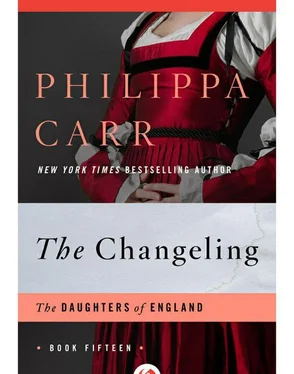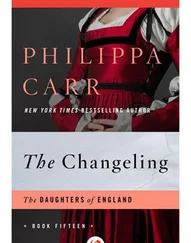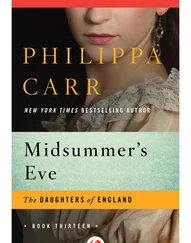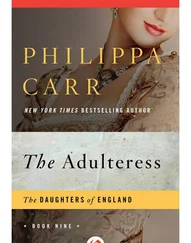Her brother added: “Yes, very much.”
“It must be soon,” added my grandfather. “Rebecca’s home is in London and we don’t know how long she will be staying with us.”
“Very nice,” they said.
The men doffed their hats and we went on our way.
“They seem very pleasant,” said my grandfather; and I agreed.
“I think it is time we started back,” he said. “We spent longer than I intended at Dorey. Still, you had to see Marian and Jack and the twins.”
On our way home we went past Mrs. Polhenny’s cottage with the prim curtains drawn across all the windows. I thought of Leah working away at her embroidery behind one of them and started once more to wonder about her.
My grandmother was interested to hear of our encounter with the Bourdons. “I’ll think about making a date right away,” she said.
There were no schoolroom meals at Cador. I took them with my grandparents. They said that they did not see me often enough and did not want to lose a moment of my company. Miss Brown had her meals with us too.
That evening we talked of the Bourdons. My grandmother had already sent a note over to High Tor inviting them.
“I am so sorry for people who find it necessary to leave their countries,” my grandmother was saying.
“We had a great number of them over here at the end of last century,” added my grandfather.
Miss Brown remarked that the French Revolution was a dreadful piece of history. “We shall be covering it when you have finished with the English Prime Ministers, Rebecca.” She added, turning to my grandparents: “I thought she should know something of them, as she will soon be living in political circles.”
“An excellent idea,” said my grandfather. “How interesting it must be.”
“These leaders are so important,” said my grandmother.
“The trouble is,” said Miss Brown, “that some of them are not truly fitted for the post. Perhaps all great men have some flaws.”
“As the rest of us do,” said my grandfather.
“Napoleon the Third certainly had his.”
“You know who he is, Rebecca?” My grandfather had turned to me. He never left me out of the conversation.
“Well, he was the French Emperor before the war, wasn’t he?”
“Exactly. It is a great mistake for people to have responsibility simply because they are related to the great. There was only one Napoleon. We did not need a second or a third.”
“I suppose it is their name,” I said. “And they have a right to it.”
“His father was Louis Bonaparte, King of Holland, brother of the first Napoleon, and his mother Hortense de Beauharnais, Napoleon the First’s stepdaughter,” said Miss Brown, who could never resist turning any conversation into a lesson. “From an early age he wanted to follow in his uncle’s footsteps.”
“So he succeeded in becoming Emperor,” said my grandmother.
“And his early career was one disaster after another,” continued my grandfather who was as interested in history as Miss Brown. “His vainglorious attempts to call attention to himself resulted in a term of imprisonment. First he was shipped to the United States and then he came here to England where he was for a while, but he saw his chance with the outbreak of the revolution in ’48, returned to France, acquired a seat in the National Assembly, and started to work for the imperial title.”
“Well, he succeeded in getting it, apparently,” said my grandmother.
“Yes, for a time.”
“Quite a long time, I believe,” she replied.
“He wanted a name to compare with that of his uncle. But he hadn’t the same genius.”
“And where did Napoleon’s genius lead him?” demanded my grandmother.
“Elba and St. Helena,” I cut in, eager to show them that I knew something of what they were talking about.
Miss Brown threw me a glance of approval.
“All might have been well,” continued my grandfather, “if he had not become jealous of the growing power of Prussia, and underestimated it. He provoked war with Prussia. He thought he could defeat them easily and win glory for himself. He reckoned without the discipline of the Prussians. He must have known his fate was sealed at Sedan.”
“And then the Bourdons decided to get away,” I said, trying to turn the conversation to a subject of more immediate concern to us.
“Very far-seeing indeed,” said my grandfather. “Revolution in Paris … disaster for Napoleon III. And as a consequence we have the Empress and her son at Camden House in Chislehurst … and the Emperor has now joined her … no longer a prisoner … but an exile from his country.”
“Like the Bourdons,” I said.
My grandmother smiled at me. “You should never let your grandfather get on to history,” she said. “There is no stopping him once he gets started.”
“A fascinating subject,” said Miss Brown with a smile.
Just as we were leaving the dining room, one of the grooms came in with a note for my grandmother.
The Bourdons were all delighted to accept her kind invitation to luncheon.
They came as arranged and it was a very interesting meeting.
Monsieur and Madame Bourdon were, as my grandmother commented afterwards, typically French. He had a trim pointed beard, crisp dark hair and a very gallant manner. He kissed hands … even mine … and the look he gave my grandmother was clearly one of admiration. Madame was a good-looking woman and her vivacity and charm made her seem ten or fifteen years younger than she must have been. She was inclined to be plump; her hair was faultlessly dressed and her large brown eyes gave the impression that she missed little. Their English was barely adequate, but I found that quaint and charming.
The son and daughter were like their parents and I detected similar qualities. The young man’s gallantry and awareness of feminine society for instance; the girl’s svelte appearance.
They admired Cador’s impressiveness and antiquity; and my grandmother said she would show them the house after luncheon if they wished to see it. Monsieur Bourdon said it would be a great pleasure, Madame declared it would give her immense delight, and the son and daughter echoed their parents’ words.
Over lunch they talked of the terrible events in their country which had led to their exile.
I gathered that Madame Bourdon was acquainted with the Empress Eugenie and that Monsieur Bourdon had, on several occasions, been admitted to the society of Napoleon III.
“Now that our Emperor and Empress are in England … we feel that we must be with them,” said Monsieur Bourdon haltingly.
My grandmother asked them how much they liked High Tor.
“Very well … very well,” was their reply.
“Do you think you will return to France?” asked my grandfather.
Monsieur Bourdon put the palms of his hands together and shook his head from side to side, shrugging his shoulders at the same time.
“It could be … yes. It could be … no. La République.” He grimaced. “If the Emperor returns …”
“I should hardly think he would do that for a very long time,” said my grandfather.
“And in the meantime he lives in exile,” added my grandmother. “I wonder how they feel about that. It must be strange to go from all the pomp and ceremony of the French Court to quiet Chislehurst.”
“Perhaps he is happy to escape to that quiet spot.”
I noticed that Jean Pascal was watching Jenny, the parlormaid who was serving at table. Their eyes met as she held a dish of vegetables for him. She was flushed. Jenny was interested in young men, I knew. I promised myself that I would try to find out what she thought of this one.
When the meal was over we showed them over Cador.
I was with them. I liked to hear my grandfather explain the history of the place. He loved the topic so much and spoke so enthusiastically that my grandmother gently put an end to his discourse which she feared might be boring to the guests.
Читать дальше












